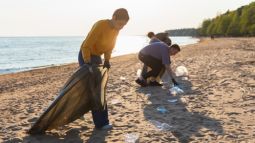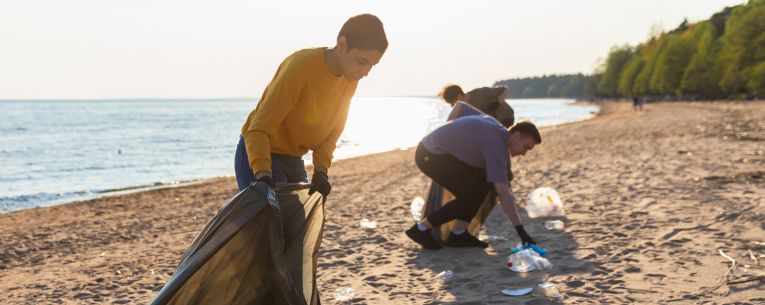You may have heard about the importance of sustainable tourism, which emphasizes enjoying wild areas, while supporting businesses leave-no-trace practices that preserve nature. Nature-positive tourism takes this a step further by calling on travelers to give back to their destinations by taking part in initiatives that rebuild natural areas, instead of simply reducing negative environmental impacts.
For example, you could take a break from lounging on the beach during your vacation to work with a non-profit to restore coral reefs in the Caribbean, or restore trails during your next hiking trip to Yosemite. Or choose to stay at a resort that sources all its food locally to give back to the surrounding area.
The idea behind nature-positive tourism was born out of a 2023 report by the World Travel and Tourism Council, detailing the human threats faced by the natural world and calling on travelers to leave a positive impact.
“Eighty percent of travel involves the traveler going into some form of nature,” Julia Simpson, president and CEO of WTTC, told the New York Times.
“For the travel and tourism industry overall, if threats to nature are poorly managed, they can contribute to all five recognized drivers of biodiversity loss, from changing land-use patterns to direct exploitation of resources, climate change, pollution and the introduction of invasive nonnative species,” Simpson continues.
Here’s the latest in travel ideas that will help you leave a positive footprint on the environment.
Stay at hotels that make “green investments,” the WTTC report says.
Sustainable tourism directs us to look for hotel properties that reduce environmental impact with practices such as eliminating plastics, implementing water saving technology, and cutting down on daily towel and sheet changes. Take this a step further by seeking hospitality companies that give back to local communities and natural areas.
One such green-minded business is Summer Island Maldives, a resort in the Indian Ocean nation. Go snorkeling above a 3D-printed reef, submerged near a coral nursery off the resort’s shores. Summer Island Maldives partnered with the Melbourne-based Reef Design Lab to establish the 3D-printed reef, which serves as a habitat for marine life and helps foster the growth of existing coral. In 2021, the reef was recognized by The Guinness Book of World Records as the largest reef of its kind.
“Projects like the 3D printed reef are popular among guests, who like that we protect our environment,” says Mari Shareef, Summer Island Resort Manager. “And it’s not only for the guests. Our staff, most of whom are Maldivian, want to protect their environment. Ultimately, we want to help promote a culture of environmental stewardship, not just at Summer Island, but across the Maldives.”
While researching hotels worldwide, the WTTC report advises travelers to be on the lookout for properties that restore damaged habitats in efforts that involve local communities, relocate structures that potentially harm habitats, and limit vehicle usage to reduce noise pollution. The report also suggests that hotel properties minimize stress on supply chains and reduce emissions by growing food on-site when possible.
You should also choose to be a guest of nations that support green tourism and giving back to communities.
Many African nations where Safaris and other forms of wildlife tourism are popular have made great strides to protect the wildlife, by partnering with their citizens to uplift communities and protect nature.
In South Africa, where rhino poaching has been a long-time problem, government agencies have partnered with stakeholders on protecting rhinos. “Many organizations, including government agencies, private conservancies and safari lodges have incentivized people so that local communities actually can earn more by protecting their rhinos,” Simpson says.
Rwanda has become a leader in reforestation efforts. The small East African nation is part of global efforts to “bring 150 million hectares of the world's deforested and degraded land into restoration by 2020, and 350 million hectares by 2030,” according to the International Union for the Conservation of Nature.
In the South American nation Colombia, where drug trafficking is rife, the national government has worked to bolster its tourism economy and provide gainful employment, by re-integrating former FARC guerillas as nature tour guides.
And nations such as Bhutan, and recently Iceland, charge a tax on tourism that goes towards efforts to protect beloved natural landscapes.
Travel is expensive. Be sure to protect your investment with travel insurance.
Travel insurance by Allianz Global Assistance can reimburse non-refundable expenses you may incur if your trip is canceled or delayed for covered reasons. Let’s say you, a child, or an aged parent in your care becomes too sick to travel before your flight, but it’s too late to cancel your hotel reservations. Allianz Global Assistance can prevent you from not having that money when you’re ready for your next adventure.
You should also know that your domestic health insurance plan may not fully cover you abroad. Travel insurance by Allianz Global Assistance may help you fill those gaps if you have a medical or dental emergency while traveling internationally.
Get a quote today to find out how Allianz Travel Insurance can help you travel with peace of mind.
Related Articles









Share this Page